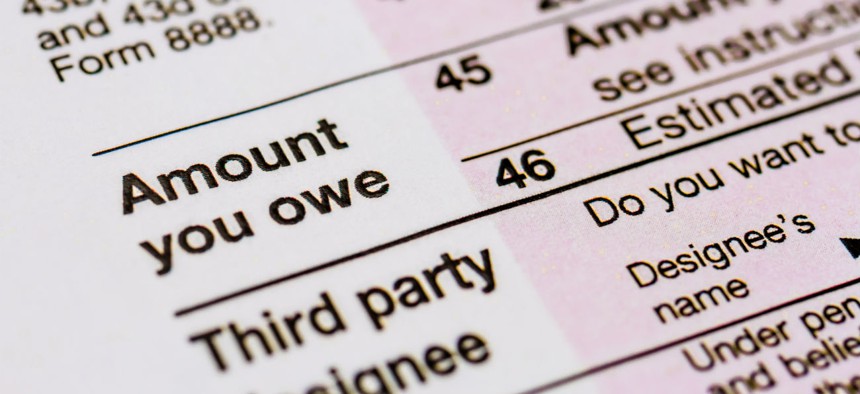
By Teri Virbickis / Shutterstock.com
IRS Privatization Program for Collecting Tax Debts Triples Profits in 2019
The new revenue is helping IRS hire, but critics warn program is targeting nation's most vulnerable taxpayers and lagging behind projections.
The federal government’s program outsourcing the collection of longstanding tax debt to private companies tripled the profits it brought to the Internal Revenue Service this year, though it still fell short of the revenues lawmakers had anticipated.
The private debt collection program brought in $212 million from taxpayers in fiscal 2019, up from $82 million the previous year. The four companies participating in the program took commissions of $39 million, leaving—after other administrative costs—$148 million in net revenue to the IRS. That is up from $51 million in 2018.
Under the 2015 law that authorized the privatization program, one-quarter of that revenue goes directly into a fund for hiring IRS tax collectors. The agency hired 100 new employees using those funds so far and plans to hire 100 more next year.
Still, revenues lag behind projections made by the Congressional Budget Office in 2015 prior to the law’s passage. CBO estimated the private collection program would bring in $492 billion in 2019, more than double the actual revenue. Kristin Walker, a spokeswoman for The Partnership for Tax Compliance, said CBO analysts assumed IRS would take a more aggressive approach in ramping up the program. The revenue outpaced a projection of $114 million IRS made earlier this year.
The program launched with some controversy, after previous efforts to recoup some of the nearly half a trillion dollars in owed taxes that go uncollected each year using private companies were scrapped due to poor management and negative returns. The National Taxpayer Advocate housed within IRS has frequently criticized the program since it relaunched in 2017, saying it is disproportionately targeting taxpayers who "cannot afford to pay for their basic living expenses.” The advocate’s office also said the program is “simply substituting for the IRS inventory queue,” leading to private companies taking commissions without adding value.
Walker, however, said the companies are conducting work the IRS can no longer afford to do after nearly a decade of budget and staffing cuts.
“IRS has not had internal staff capacity to contact these people,” she said, adding the companies are helping the agency “expand customer service capacity.” She said the private tax collectors “humbly disagree” with the taxpayer advocate’s findings that they are unduly targeting vulnerable taxpayers, noting the companies work with tax delinquent individuals to set up payment plans based on what they can afford.
The Treasury Inspector General for Tax Administration also gave the program a harsh early review last year, saying the private companies were leaving taxpayers vulnerable to scams and exploitative practices and bringing in just a small fraction of the debt they are assigned to collect.
The program has received bipartisan, high-profile support, however, most notably from Sen. Chuck Grassley, R-Iowa, who chairs the Senate Finance Committee, and Senate Minority Leader Chuck Schumer, D-N.Y.
“Numbers don’t lie,” Grassley said. “This is the most recent in a series of reports that have given me confidence in the program’s ability to make the system better for law-abiding citizens while also strengthening the effectiveness of the IRS.”
The National Treasury Employees Union, however, which represents most IRS employees, said the numbers do not paint the full picture. If Congress had spent the money it invested in standing up the private collection program in the IRS itself, said Tony Reardon, NTEU’s president, it would have realized a greater return.
“The ability of the IRS’ private debt collection program to finally operate in the black is of little consolation,” Reardon said. In addition to higher revenues for the government, he added, “Taxpayers, many of whom are struggling to pay their federal tax bill, would have received better customer service from professional civil servants who are committed to protecting taxpayer rights, not collecting commissions.”
NEXT STORY: Congress Moves to Block OPM-GSA Merger







